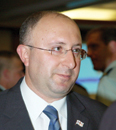Polling stations open in Abkhazia, South Ossetia for Russian parliamentary election
By Eter Tsotniashvili
Wednesday, November 28

“The Duma has decided to open polling stations in Tbilisi, Sokhumi, Gagra, Gudauta and in Tskhinvali. The only thing they agreed on with the Georgian side was to open a polling station in Tbilisi,” the State Ministry for Conflict Resolution said in a statement.
Tbilisi slammed the move as a blatant violation of Georgia’s sovereignty and interference in the country’s internal affairs.
“This will be followed by diplomatic activities. We have informed the international community,” said State Minister for Conflict Resolution Davit Bakradze on November 27.
Many residents of secessionist South Ossetia and Abkhazia, where Russian forces act as peacekeepers, have Russian passports.
“Given activities like this, it is necessary to look over the peacekeeping format in Abkhazia,” Bakradze added. “I think facts like this will strengthen our argument as to why the peace process is ineffective, and how Russia is not fulfilled its duty to be an objective mediator.”
Foreign Affairs Minister Gela Bezhuashvili added to the condemnation.
“In spite of Georgia’s negative reaction, Russia is still going to hold elections in the conflict zones. It’s strictly forbidden to hold elections [in another country] without permission. We will assess this as an unfriendly action,” Bezhuashvili said, according to Rustavi 2.
“They distributed Russian passports [under the guise of] humanitarian activities,” he continued.
The Russian Embassy in Georgia confirmed that polling stations would be opened in Abkhazia and South Ossetia, adding that they have officially notified the Georgian Ministry of Foreign Affairs.
“Russia wants to ensure the constitutional rights of its citizens” by giving them the opportunity to vote in Georgia’s breakaway regions, an embassy employee said.
The de facto president of South Ossetia, meanwhile, urged South Ossetians to vote in the election. The votes would encourage integration of the breakaway region with Russia, he told them, according to the de facto South Ossetian press and information committee.
The Duma election is scheduled for December 2 in Russia, but voting will begin a few days earlier in Abkhazia and South Ossetia.
The Georgian foreign minister also commented on the decision of the CIS Council of Defense Ministers to prolong the commission of Sergey Chaban, the Russian commander of the CIS peacekeepers in Abkhazia.
After an October 30 confrontation between Russian peacekeepers and Georgian soldiers in the state-controlled village of Ganmukhuri, just before the administrative border with secessionist Abkhazia, then-president Mikheil Saakashvili demanded that Chaban be expelled from all de jure Georgian territory.
“Chaban will remain persona non grata for Georgia,” said Foreign Minister Bezhuashvili at a November 27 press conference. “Legally this decision has no effect. To begin with, Georgia is not part of [the CIS Council of Defense Ministers], and secondly this council doesn’t have the authority to make this decision.”
Russian Defense Minister Anatoliy Serdyukov said they have prolonged Chaban’s commission, the Russian news agency RIA Novosti reports, but would soon find someone to replace him given the circumstances.
“The peacekeepers are working well and coping with their duties. We have prolonged [Chaban’s] mandate, but in the nearest future we should find an alternative,” Serdyukov said at a November 27 press conference in Astana.